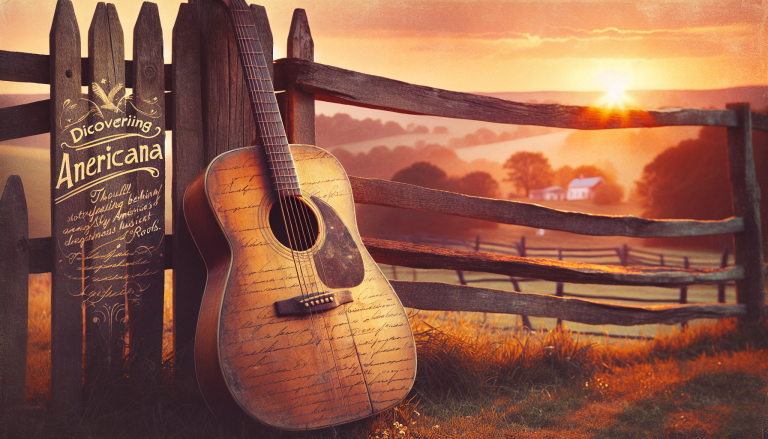The Roots of Americana Music: A Tapestry of American Stories
Americana music is more than just a genre; it’s a living, breathing anthology of American culture, stitched together with the threads of folk, country, blues, and rock music. Rooted deeply in the soil of the United States, this musical genre captures the heartbeats of everyday life, storytelling, and the spirit of resilience. To appreciate Americana music, one must peel back layers of time and place, journeying through its historical context that bridges the old and the new in a distinctly American sound.
Americana emerged in the 20th century as a response to the commercial gloss washing over popular music scenes. It became a refuge for authenticity — an avenue where artists could marry tradition with contemporary narratives. Often considered a subset or cousin of American music, Americana encompasses a rich palette of styles, deeply threaded with the experience of rural and small-town America. It features acoustic and electric instrumentation, heartfelt lyrics, and a storytelling heritage that resonates with themes of love, loss, wanderlust, and hard-earned hope.
The Sound and Soul of Americana Music

Defining Americana music is both straightforward and complex. At its core, it is a hybrid genre that combines the roots of country, folk, blues, and sometimes touches of rock music. But it’s not just the blend of sounds that sets Americana apart; it’s the spirit of the music—raw, unpretentious, and intensely narrative-driven. Often characterized by twangy guitars, harmonicas, upright bass, and honest vocals, the genre thrives on its ability to evoke images of dusty roads, front porches, and wide-open landscapes.
One could say Americana is the soundtrack of the American experience — stories told from the vantage point of common folk navigating their way through life’s complexities. The lyrics often reveal a deeply personal or communal truth, handed down from generation to generation. Its sound is warm and approachable, but with an edge that reflects the grit and grind of existence in America’s heartlands.
Key Artists Who Defined Americana’s Heartbeat
Exploring Americana music without spotlighting its key architects would be like missing the wood in a guitar’s resonant body. Among its pioneers and prominent voices, names like Johnny Cash loom large. Cash’s stark, moral narratives and southern twang set a blueprint for Americana’s blend of country storytelling and rock-inflected rhythms. His album “At Folsom Prison” remains a vivid chronicle of human struggle, redemption, and survival.
Emmylou Harris brought a hauntingly beautiful folk sensibility to the genre, her voice weaving delicate tales of love and loss, enriching the Americana palette with a touch of vulnerability and warmth. Her collaborations with Gram Parsons further grounded the fusion of country and rock music into the burgeoning Americana tapestry.
Fast forward to the ’90s and 2000s, and the genre welcomed artists like Gillian Welch, whose minimalist soundscapes and poetic lyrics evoke a timeless Americana sensibility. Uncle Tupelo and later Wilco further pushed boundaries, blending alternative rock with traditional American music, cementing Americana as a fluid and evolving genre.
Jason Isbell, a modern torchbearer, carries the genre into new territory, with songwriting that is both introspective and broadly resonant — capturing the essence of American music with piercing honesty and emotional depth.
Notable Albums That Echo Through Time
Pinpointing albums within Americana music highlights a journey through American landscapes and narratives. Johnny Cash’s “American IV: The Man Comes Around” epitomizes a late-career reflection soaked in wisdom and reverence for life’s battles. The rawness of Cash’s voice against minimalist arrangements strips the music down to its emotional core.
Gillian Welch’s “Time (The Revelator)” is a masterclass in Americana’s roots, with diegetic storytelling that pulls listeners into the depths of human emotion and rustic American imagery. It’s an album that feels both ancient and urgent, bridging past and present.
The Band’s eponymous 1969 album shines as a milestone, blending rock music with American roots influences so effortlessly that it laid groundwork for Americana as a recognized genre. Songs like “The Weight” and “The Night They Drove Old Dixie Down” build narratives loaded with historical contemplation and vivid character sketches.
More recent milestones include Jason Isbell’s “Southeastern,” an album that elevates Americana to a confessional art form — where rock music’s edge sharpens Americana’s storytelling prowess.
The Lasting Effects: Americana’s Resonance in Today’s Music Landscape
What’s remarkable about Americana music is how it continues to evolve while remaining tethered to its foundational values of storytelling and authenticity. It serves as both a preservation and a reinvention of American music traditions — forging connections between generations and geographies.
In an era dominated by polished pop and electronic beats, Americana offers an earthy counterpoint that feels essential and grounding. Its capacity to absorb elements from rock music and other genres enables a vibrant dialogue between the past and present, ensuring Americana never stagnates but grows richer with each new voice.
This genre’s influence extends beyond record sales and concert halls; it permeates cultural understanding of American identity. Americana has become a platform for voices that might otherwise be overshadowed — rural communities, marginalized perspectives, and the unvarnished stories of everyday life.
Musicians today continue to draw from Americana’s wellspring, using its language of grit, melody, and narrative to express modern complexities. The genre’s blend of heavy metal music’s intensity (in certain Americana-adjacent acts) and folk’s intimacy underscores Americana’s versatility and enduring appeal.
A Living Chronicle of American Music
Americana music is a testament to the power of roots and evolution embracing each other in harmony. It remains an essential pillar of American music, capturing the spirit of a nation through sound and word. This genre, enriched by its historical context and imbued with a storyteller’s soul, beckons listeners to rediscover the landscape of America — one chord and lyric at a time. Whether you’re drawn to the raw edges of heavy metal music or the heartfelt strumming of a folk guitar, Americana holds a space where all these influences converge, making it a genre worth diving into with both curiosity and reverence.